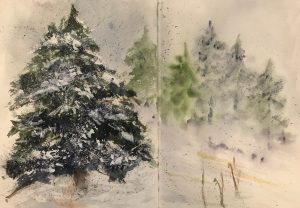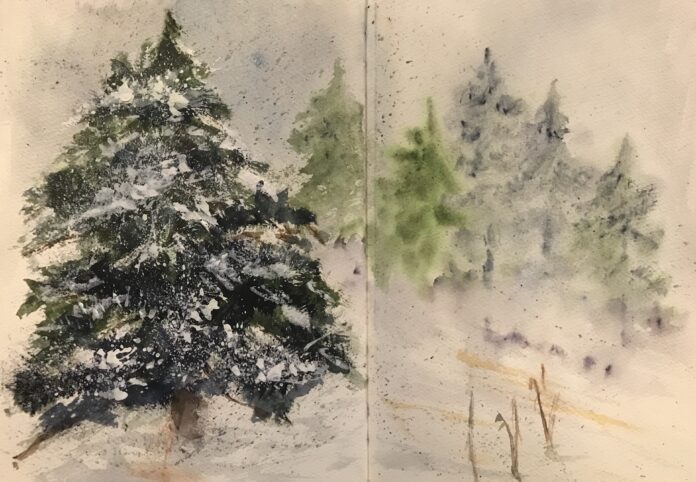BY LESLIE REGO

Henry Thoreau, an American naturalist who lived from 1817 to 1862, loved winter. After a huge snowstorm in January 1855, he wrote, “It is like the beginning of the world.” As he walked to town, he mused, “The sight of the pure and trackless road up Bristler’s Hill, with branches and trees supporting snowy burdens bending over it on each side, would tempt us to begin life again.”
Thoreau adored the pine trees carrying their heavy burden of snow. He wrote about them over and over again, always searching for a new description or a different allegory to properly detail how glorious they were in their caps of snow. He felt the pine, bowed down with snow, exhibited “a kind of interior and household comfort, a shelter and covert aspect. It has the snug inviting look of a cottage on the moors, buried in snow.”
Thoreau wrote complex passages enamored with the appearance of snow draped on branches. “At the same time the lowermost small black and dead horizontal limbs near the ground, where there is least wind and jar, these almost exclusively, say for six or eight feet up, are covered with upright walls of snow five or six times their own height and zigzagging with them like the Wall of China… or rather it is a labyrinth, a sort of cobweb, of broad white belts in the air.”
Winter was a mystical time for Thoreau, full of new formations, perceptions and landmarks. He never felt up to the task of conveying the emotions he felt during a winter storm. And after the storm, with the pristine snow covering the trees and grounds, he felt even less able to chronicle the beauty surrounding him. Even after numerous sentences of descriptive language, Thoreau would bemoan, “I doubt if I can convey an idea of the appearance of the woods yesterday, as you stood in their midst and looked round on their boughs and twigs laden with snow.” And later that week, a few days after the storm, he once again felt inferior to the task. “I am afraid I have not described vividly enough the aspect of that lodging snow of the 19th.”
English is an amazing language with a broad vocabulary—171,476 words in current use, and around 47,156 obsolete words. The extensive vocabulary comes from English accepting words from many different languages. Around Thoreau’s time, there were probably fewer words in daily speech (although some of the now obsolete words were most likely part of everyday communication), and even so, Thoreau found it arduous to describe winter!
Many thanks to Richard Higgins and his book, “Thoreau and the Language of Trees.”
Leslie Rego is an Idaho Press Club award-winning columnist, artist and Blaine County resident. To view more of Rego’s art, visit leslierego.com.

